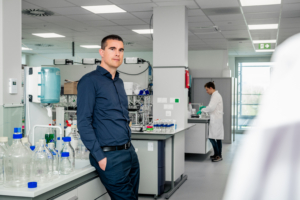
Providing access to Covid-19 medicines and vaccines
IP U.S. reverses stance, backs giving poorer countries access to COVID vaccine patents:
President Joe Biden in May threw his support behind waiving intellectual property rights
for COVID-19 vaccines – very much to the surprise of the biotech world.
Giving poorer countries access to medicines is a goal that should definitely be achieved as fast as possible. Would patents or giving access to patents accomplish that goal and magically produce vaccines and distribute them in the near future?
In October 2020, Moderna had promised not to enforce its Covid-19-related patents for the duration of the pandemic. Moderna opened the door for manufacturers that might want to produce the Moderna vaccine. Pfizer and Moderna offered to provide vaccines at cost to the rest of the world, particularly the 92 poorest countries that are supplied with vaccines through the ACT Accelerator. The current manufacturers are entering into huge collaborations in order to enhance and speed up the worldwide production of vaccines.
Barriers to production
The actual bottleneck for providing vaccines to everyone is not a legal barrier made of patents. The actual bottleneck is manufacturing resources including huge constraints on some of the raw materials and equipment used to make vaccines. In addition, there are only a few manufacturers that have the expertise to produce these complicated biologics.
Even if there were no patents at all on Covid-19 vaccines, generic manufacturers could not that easily copy the manufacturing process in the near future. There are hundreds of process steps involved in the manufacturing of said vaccines and hundreds of checkpoints for testing to assure the quality and consistency of manufacturing. Even if IP was waived, the transfer of skills remains the biggest challenge.
Thus, if the goal was to provide vaccines to everyone as fast as possible then surely it would be more effective to support the originators who promised to give the vaccines at cost? Why should it be more effective to waive patents, and let generic manufacturers go through a steep and time-consuming learning curve in order to acquire the needed know-how and skills? Honestly, in view of the actual bottleneck, it is not clear why waiving patents should be helpful at all to speed up vaccine production and distribution.
Michelle McMurry-Heath, CEO of the trade group of the US Bioindustry Organization (BIO), rightly stated, “handing needy countries a recipe book without the ingredients, safeguards, and sizable workforce needed will not help people waiting for the vaccine.” It would be necessary to transfer the mRNA technology broadly with full access to trade secrets and know-how instead of just waiving patents.
Counterproductive measure
Moreover, a waiver of patents would be very detrimental as Jeremy Levin, chairman of the trade group BIO stated: “If you do this to the companies who all stepped forward in January 2020 to build vaccines, and you strip them of the intellectual property; I’m not sure what is going to happen in the future when the next pandemic comes. You will probably not have the BioNTech’s, the Moderna’s, the Pfizer’s of the world voluntarily investing billions of dollars as they did. This is most unwise and we need to fight it tooth and nail.” Furthermore, what about medications that already exist or are under development that could rescue severely ill Covid-19 patients? Clinical Phase III studies must still be conducted to get them approved. This begs the question of why on earth a company would invest in such an undertaking if the price was stripping them of the IP rights. It will just not happen, sadly. And it will not happen because of Biden’s absurd proposal.
Strategical know-how
There is another danger as Levin pointed out referencing the Council on Strategic Risks: “The National Academies of Sciences, Engineering, and Medicine (NASEM) released a report titled Biodefense in the Age of Synthetic Biology in 2018. At the time, the report concluded that there are significant challenges “to determining the right targets or edits, packaging the genetic cargo into viral vectors, and delivering it to appropriate host cells.” Since then as CSR concluded “Unfortunately, the barriers that Moderna has overcome appear to be the same barriers that the 2018 NASEM report stated were in the way of mRNA bioweapons. “If you transfer mRNA technology today to any nation, that nation now may have the capacity to build biological weapons based on the use of mRNA. So, I regard this as not just an issue of health, it is also dangerous from a national and international security perspective.”
Thus, waiving IP rights is a dangerous proposal that is not only unhelpful in providing access to vaccines for poorer countries, but also endangers the provision of Covid medication and vaccines for future pandemics and endangers national security.
Most importantly, if waiving IP is not helping for providing access to Covid-19 vaccines soon what are these proposals of waiving IP good for? It may be the wish of some countries like China, Russia, India to get access to the mRNA technology with all the trade secrets beyond this pandemic. It is by no means the solution to current Covid-19-related bottlenecks. And if the USA wishes to help Africa to get vaccines Biden should just export and distribute these vaccines to those countries. Obviously, Biden does not wish to help with providing vaccines to Africa but instead sacrifices patent in a hypocritical attempt of pretending to provide help.
Patents have been indispensable for the development of the mRNA technology that led to the Covid vaccine as they provide the indispensable incentive for investors to finance extremely expensive development of drugs. Thus, no patents, no investment, no new drugs. Patents are the currency for necessary collaborations between universities, biotech’s and big pharma. If successful drug companies are punished with disappropriation once they are successful no one will take on the risk of developing drugs in the future bearing in mind the high failure rate of drugs: on average, only 1 to 2 of every 10,000 substances synthesized in laboratories will become a marketable medicine. If patents are waived then the ecosystem that creates new drugs will be destroyed.
This article was originally published in the Summer Edition of European Biotechnology Magazine.


 FDA
FDA University of Geneva
University of Geneva MRM Health NV
MRM Health NV